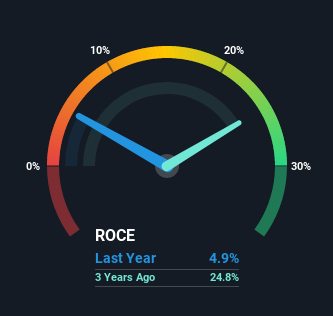- United States
- /
- Healthcare Services
- /
- NasdaqGS:PNTG
Pennant Group (NASDAQ:PNTG) May Have Issues Allocating Its Capital

Did you know there are some financial metrics that can provide clues of a potential multi-bagger? In a perfect world, we'd like to see a company investing more capital into its business and ideally the returns earned from that capital are also increasing. Ultimately, this demonstrates that it's a business that is reinvesting profits at increasing rates of return. Although, when we looked at Pennant Group (NASDAQ:PNTG), it didn't seem to tick all of these boxes.
What is Return On Capital Employed (ROCE)?
If you haven't worked with ROCE before, it measures the 'return' (pre-tax profit) a company generates from capital employed in its business. Analysts use this formula to calculate it for Pennant Group:
Return on Capital Employed = Earnings Before Interest and Tax (EBIT) ÷ (Total Assets - Current Liabilities)
0.049 = US$21m ÷ (US$507m - US$89m) (Based on the trailing twelve months to December 2020).
Therefore, Pennant Group has an ROCE of 4.9%. Ultimately, that's a low return and it under-performs the Healthcare industry average of 11%.
Check out our latest analysis for Pennant Group

In the above chart we have measured Pennant Group's prior ROCE against its prior performance, but the future is arguably more important. If you're interested, you can view the analysts predictions in our free report on analyst forecasts for the company.
What Can We Tell From Pennant Group's ROCE Trend?
In terms of Pennant Group's historical ROCE movements, the trend isn't fantastic. To be more specific, ROCE has fallen from 25% over the last three years. Although, given both revenue and the amount of assets employed in the business have increased, it could suggest the company is investing in growth, and the extra capital has led to a short-term reduction in ROCE. If these investments prove successful, this can bode very well for long term stock performance.
On a related note, Pennant Group has decreased its current liabilities to 18% of total assets. That could partly explain why the ROCE has dropped. What's more, this can reduce some aspects of risk to the business because now the company's suppliers or short-term creditors are funding less of its operations. Some would claim this reduces the business' efficiency at generating ROCE since it is now funding more of the operations with its own money.
Our Take On Pennant Group's ROCE
While returns have fallen for Pennant Group in recent times, we're encouraged to see that sales are growing and that the business is reinvesting in its operations. And long term investors must be optimistic going forward because the stock has returned a huge 138% to shareholders in the last year. So while the underlying trends could already be accounted for by investors, we still think this stock is worth looking into further.
Pennant Group does have some risks though, and we've spotted 1 warning sign for Pennant Group that you might be interested in.
While Pennant Group isn't earning the highest return, check out this free list of companies that are earning high returns on equity with solid balance sheets.
When trading Pennant Group or any other investment, use the platform considered by many to be the Professional's Gateway to the Worlds Market, Interactive Brokers. You get the lowest-cost* trading on stocks, options, futures, forex, bonds and funds worldwide from a single integrated account. Promoted
New: Manage All Your Stock Portfolios in One Place
We've created the ultimate portfolio companion for stock investors, and it's free.
• Connect an unlimited number of Portfolios and see your total in one currency
• Be alerted to new Warning Signs or Risks via email or mobile
• Track the Fair Value of your stocks
This article by Simply Wall St is general in nature. It does not constitute a recommendation to buy or sell any stock, and does not take account of your objectives, or your financial situation. We aim to bring you long-term focused analysis driven by fundamental data. Note that our analysis may not factor in the latest price-sensitive company announcements or qualitative material. Simply Wall St has no position in any stocks mentioned.
*Interactive Brokers Rated Lowest Cost Broker by StockBrokers.com Annual Online Review 2020
Have feedback on this article? Concerned about the content? Get in touch with us directly. Alternatively, email editorial-team (at) simplywallst.com.
About NasdaqGS:PNTG
Solid track record with excellent balance sheet.
Similar Companies
Market Insights
Community Narratives



